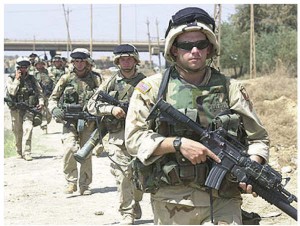Jan
19
The Nightmare Revisited
Filed Under Life, Peace, Today's War, Trauma, War | Comments Off on The Nightmare Revisited

By Janet J. Seahorn
Last year at this time, Tony and I were in Vietnam and Cambodia. It was a humbling, yet inspiring excursion. As Tony stated many times, he did not go there to heal or recreate the war. He wanted to visit, only to see how things had changed, with hopes that the people and the country were mending.
By all outward appearances hope seemed to be occurring. Yet, what keep coming back to me, were the faces of the old women. We did not see the same number of older men, perhaps because many of this age were killed in the war. The women’s faces were not happy. Their features lined with rivers of anger. It was the eyes that held the emotions, and for many, their emotions were tortuous and hate-filled. What haunts me now are the faces I glimpse in the newspapers of civilians in Iraq and Afghanistan; similar looks living in human bodies experiencing similar horrors of war.
As we continue to read of the escalation of suicides of returning military men and women, I wonder if such unforgettable faces are haunting them. Faces of the enemy, faces of their comrades, faces of the children? In the first few blogs of this New Year, I wrote of Peace. Can it be attained in a person’s mind and heart after experiencing so much? I very much want to believe such a peace is possible. For others, the hideous experiences continue to dig deeper ravines into the soul. To heal, even a bit, these gorges must be filled in gradually.
Perhaps not fully, but even building up the crevasses a little keeps one from falling into the yawning depths of depression, anxiety, and hopelessness. As long as one can look up and see the sky, hope is present. It is when one’s existence is swallowed in darkness that even the tiniest light is diminished. Finding ways to keep the sunlight accessible for our returning vets will be the work of everyone: the nation, its people, families, friends, communities, and most importantly, the veteran.
We have troops leaving daily for the war zone, and others returning. A 2008 Rand Corporation study revealed that 300,000 troops who served in Iraq and Afghanistan had Post-Traumatic Stress, while 320,000 reported probable traumatic brain injuries. Both conditions greatly increase the likelihood of attempted suicide. “According to a Congressional Quarterly compilation in late November 2009, 334 active-duty military service men and women have taken their own lives in 2009” (Edward Pages, 2009: The Year of Soldier’s Suicide), and this does not include those military individuals who have been discharged.
Let us all be sure to look into these eyes of freedom and not dismiss the signs of their sacrifice. Peace and healing is everyone’s work; everyone’s answerability. As a nation, it must be our core mission to mend and heal all those that fought in lands where few of us ever think to venture.
I doubt if many of our returning military personnel have rational thoughts of wanting to return to the combat zone. It took almost forty years for us to do so.
One of our favorite veterans, Michael MacDonald, wrote us the other day relating his response to those who frequently ask him if he ever wants to return to Vietnam for a visit. His reply, “Why, I was just there last night.”
And, for many, this statement is all too true. It is those nights without returning that we pray for in our sleep and dreams. It is those nights without revisiting the nightmares that keep us healing.
Jan
12
Another Perspective on War
Filed Under PTSD, Today's War, Trauma | 1 Comment
by Janet J. Seahorn
It is a snowy Sunday afternoon. I have been running errands, not because I have a great deal to do after the holidays; to be honest, I am merely trying to keep from thinking about the escalation of the war in Afghanistan. When I got home, Tony had posted a new message on our blog that began with “I seem to spend a lot of time thinking about war, even when I don’t want to. The reality of war. The horror of war…” With this blog he added an article from our local newspaper, The Denver Post. It was another reality check from troops actually involved in war, versus media or political rhetoric.
Every day we get emails, phone calls, or an acquaintance sharing a tragic story about a loved one, friend, or just someone they distantly know who is struggling with Post-Traumatic Stress. For those who have and are serving in the current conflict, the stories are so similar to Vietnam veterans it is down right eerie.
For some individuals the nightmares begin immediately. Others seem OK for the first six months or even a year, and then it begins, the panic attacks, unresolved anger, anxiety, and night terrors. The narratives, however, seem to remain the same. The vet initially attributes the emotions to some external force. He/she claims the feelings aren’t real. Given time, everything will be just fine.
Denial is an interesting strategy and may work for a short time, but sooner or later friends and family members will begin to feel the impact of the warrior’s pain. Owning the trauma is the first step to managing it.
I can’t begin to count how many people who have never served in the military, have never had to sacrifice their physical and emotional lives, have never lived with a parent or sibling who is carrying the war’s trauma in every cell of his body says something like, “there is a silver lining in these wars”, “if we don’t fight them there, we will have to fight them here on American soil”.
It isn’t that these individuals are unkind or uncaring; they merely have not had the experience of combat that comes with a very high personal price tag. The ultimate “Golden Globe of Thoughtlessness”, however, are those who doubt that PTSD even exists, and that if it does, it can be easily treated or overcome with just a little effort and personal fortitude.
OK, I admit, I sound cynical. Perhaps what might appease me a bit is giving all of those “others” a chance to sacrifice a bit of what our veterans are enduring. Perhaps, if the families of those “others” would have to witness and battle the demons in their homes with their loved ones, maybe, just maybe, my irritation would subside a bit. Or, maybe, just maybe, one tour of duty is enough for any warrior.
What I cannot accept is that this current war is being fought by less than one percent of the American population and that one percent isn’t comprised of the well-off and well-to-do. As a country we are passively engaged in a practice that will come to haunt us.
Haunt us as a country; haunt us in our communities; and haunt us as moral beings. For sooner or later, as a nation we will have to face the consequences of our inequitable actions. The price will be expensive and ugly.
I wonder if our country’s leaders and the American people will be willing and able to cover the costs.
Jan
3
A Perspective on War
Filed Under American Patriotism, PTSD, Today's War, War | Comments Off on A Perspective on War
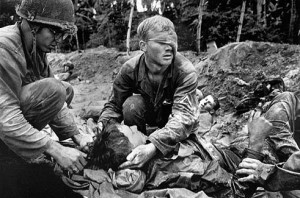 I seem to spend a lot of time thinking about war, even when I don’t want to. The reality of war. The horror of war. What does winning a war really look like? Are war and terrorism even related or is one a symptom of the other?
I seem to spend a lot of time thinking about war, even when I don’t want to. The reality of war. The horror of war. What does winning a war really look like? Are war and terrorism even related or is one a symptom of the other?
Following is an article in today’s Denver Post which provides a perspective…
-Tony Seahorn
Fool’s game: A soldier’s lament
By Megan Nix
Posted: 01/03/2010
My friend from Denver, a thirtysomething with a full red beard, a plaid shirt, and a loud, choppy laugh, looks like any guy you might have a drink with to talk about girls or music or the work week.
The last time I hung out with him, we shared a beer stein on Larimer Street during Oktoberfest and talked about Halloween costumes. During a more recent happy hour, we talked about the summons he received to deploy to Afghanistan.
Because of the Army’s Uniform Code, I can’t name him. Suffice it to say he’s the one person in the 30,000 who got that call to whom I can give a voice.
It was Nov. 11, 2009, Veterans Day, when my friend was called back to war. His friends had taken him out to shoot clay pigeons in honor of his being a veteran in Iraq, and when he went to his parents’ house for Sunday dinner, a big envelope was waiting for him. He went down into the basement where his father, a potter, was shaping clay. “I just walked up to him and gave him a hug,” he says, smiling from above the amber glow of his draft beer. Hugs are not something he regularly does. “Then I stepped back, and I said, ‘Dad, I’m going to Afghanistan.’ ”
Like most soldiers, he’s dealing with some of the same symptoms as one of his heroes, Audie Murphy, a World War II vet who publicized the unseen wounds of war. Fear, insomnia, depression, a loss of faith in our country’s leaders, and a nightmarish reluctance to re-enter the world “outside the wire.” Like any young man who’s already been to war once, my friend is doing everything he can in order to not be deployed twice.
When he served in Baghdad, there were four to five American deaths a day, the city was a “cesspool,” and “generals were being moved around like playing cards. People don’t realize how much worse it is than what you see on TV. In a city that goes to war, services stop – sewage, water – there’s very limited law and order. You can’t even imagine how awful the world is when a war is happening there.”
Despite his hearty laugh and recurring shrugs, he exudes disillusionment. We’re nestled in a leather booth, and at the bar, two toothless men start to shove each other against the stools and shout obscenities.
“I bet you,” my war-bound buddy says, “at least one of them is a vet.” It doesn’t matter if they’re vets or not, at least one person here is, and those unseen wounds of war? I can see them in this bar.
“My job in Iraq as a public affairs specialist was to prove, ‘What’s the good here? What’s the silver lining? How can I slant this to look good?'” my friend explains. “If you’re very honest,” he says, with signature honesty and one hack of a laugh, “you could never do it.”
One of the reasons he has agreed to talk to me is so that he can be honest, albeit anonymously. The namelessness seems to fit: Both Iraq and Afghanistan are wars largely stocked with low- to mid-level soldiers on repeated deployment. Soldiers from Nowhereville, U.S.A., young men and women who will die largely unrecognized for being, as my friend says, “some sort of hero.”
He’s not in the business of sugar-coating. Bombs are the best way to kill because no one has to be there, he tells me. He recounts how the fluids on the floor of a walk-in freezer stacked with car bomb victims flowed, tar-black, to a drain under his feet. “Beyond capacity,” is how he describes the scene of the nameless corpses. “Innocent victims of roadside bombs gone wrong. The unwanted. Victims that will never ever be identified.”
My friend’s insights increase with the drinks. He points out that while what we have is called a “volunteer army,” life circumstances are what dictate if enlisting is in a kid’s future. “See those guys?” he points to the two men who have stopped fighting and are staring blankly at their sentinel of empty shot glasses. “If they did serve, I can almost guarantee they came from little money. No Haliburton sons and daughters are dying in Iraq or going to Afghanistan,” he says, pushing his finger into the beer-stained table. “I can’t even tell you how many Army leaders I’ve seen without a combat patch (signaling they’ve been deployed) on their right arm. It just shows you how many people aren’t bearing the weight of this war.”
The weight of his story accumulates like a collection of heavy fragments.
A break for a granola bar on the back of Vehicle 2. A deafening explosion. A puff of smoke where Vehicle 4 had been.
Like many young men who enlist, my friend wanted to be independent of his parents and the military was the best possible solution, so he enlisted five years ago. “I thought if I don’t find anything I’m passionate about, I should go,” he says.
By now, he’s gathered plenty of things to be passionate about. One of them is not returning to Afghanistan. As a technically disabled vet who already did five years, was honorably discharged, and “did everything I was ever asked,” he received the news of his “involuntary mobilization” with reluctance and disbelief. He knew he was subject to recall until June 2012, but opening the envelope was one of those times when you say, “Seriously? I mean, seriously?”
Really, he did more than he was asked to do: He volunteered to fight at a time when he knew he’d likely be deployed. He was stationed in Iraq during one of its bloodiest summers. And, most importantly, he came back.
He also has simpler reasons for not wanting to return: He doesn’t know if he can pick up a 200-plus-pound person. He doesn’t want to carry a weapon. And he doesn’t want to be a pawn in a game of politics if part of the reason the withdrawal is scheduled for 2011 is because President Obama is up for re-election in 2012.
After opening his Afghanistan envelope, my friend immediately called his superior to appeal. “What’s the deal?” he asked. “I cannot do this again.” And the noncommissioned officer on the phone replied: “Look, we are scrounging the bottom of the barrel right now. The bottom of the barrel.”
One of the two men at the bar says he doesn’t have the money to pay for his drinks tonight, stands up from his tattered stool to leave, then sits back down. Someone puts a coin in the jukebox and I’m hoping the song will be happy, but it’s not. Bonnie Tyler’s voice starts in on “Nothing but a Heartache.”
“I only saw the effects of war, not the worst of it,” my quieted friend admits as the song reaches its refrain. “For every war story, there’s a better story not being told. Those go to the grave. Or they’re stories that the people holding them can never begin to relive.”
Tyler croons, “It’s a fool’s game,” while I work on my next beer.
I’m not sure what I should tell this young, smiling and wounded man in front of me. That he’ll be fine and somehow his appeal will be granted, and if not, he’ll come back and we’ll have beers and it will be over. We both know that soon he’ll probably be on a plane with his 60 pounds of gear, looking for silver-lined stories to send back to middle American about the benefits of being at war.
“It’s a heartache,” she sings: “Nothing but a heartache. Hits you when it’s too late. Hits you when you’re down.”
There are many things to thank my friend for, but the only thing I thank him for at the end of the night is his time, and at least that feels like a little bit of sincerity in the midst of everything we’ve both heard and read about our reasons for sending him to Afghanistan. “I’ll see you soon,” I tell him, and the last thing I say – my minuscule gift of acknowledgment – is his name.
The silver lining in this story? I’m still looking for it.
Dec
8
A Different Christmas Poem
Filed Under American Patriotism, Christmas, Life, Today's War | 1 Comment
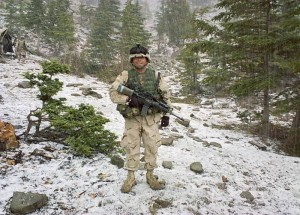
by Michael Marks
The embers glowed softly, and in their dim light,
I gazed round the room and I cherished the sight.
My wife was asleep, her head on my chest,
My daughter beside me, angelic in rest.
Outside the snow fell, a blanket of white,
Transforming the yard to a winter delight.
The sparkling lights in the tree I believe,
Completed the magic that was Christmas Eve.
My eyelids were heavy, my breathing was deep,
Secure and surrounded by love I would sleep.
In perfect contentment, or so it would seem,
So I slumbered, perhaps I started to dream.
The sound wasn’t loud, and it wasn’t too near,
But I opened my eyes when it tickled my ear.
Perhaps just a cough, I didn’t quite know,
Then the sure sound of footsteps outside in the snow.
My soul gave a tremble, I struggled to hear,
And I crept to the door just to see who was near.
Standing out in the cold and the dark of the night,
A lone figure stood, his face weary and tight.
A soldier, I puzzled, some twenty years old,
Perhaps a Marine, huddled here in the cold.
Alone in the dark, he looked up and smiled,
Standing watch over me, and my wife and my child.
“What are you doing?” I asked without fear,
“Come in this moment, it’s freezing out here!
Put down your pack, brush the snow from your sleeve,
You should be at home on a cold Christmas Eve!”
For barely a moment I saw his eyes shift,
Away from the cold and the snow blown in drifts..
To the window that danced with a warm fire’s light
Then he sighed and he said “Its really all right,
I’m out here by choice. I’m here every night.”
“It’s my duty to stand at the front of the line,
That separates you from the darkest of times.
No one had to ask or beg or implore me,
I’m proud to stand here like my fathers before me.
My Gramps died at ‘ Pearl on a day in December,”
Then he sighed, “That’s a Christmas ‘Gram always remembers.”
My dad stood his watch in the jungles of ‘ Nam ‘,
And now it is my turn and so, here I am.
I’ve not seen my own son in more than a while,
But my wife sends me pictures, he’s sure got her smile.
Then he bent and he carefully pulled from his bag,
The red, white, and blue… an American flag.
“I can live through the cold and the being alone,
Away from my family, my house and my home.
I can stand at my post through the rain and the sleet,
I can sleep in a foxhole with little to eat.
I can carry the weight of killing another,
Or lay down my life with my sister and brother..
Who stand at the front against any and all,
To ensure for all time that this flag will not fall.”
“So go back inside,” he said, “harbor no fright,
Your family is waiting and I’ll be all right.”
“But isn’t there something I can do, at the least,
“Give you money,” I asked, “or prepare you a feast?
It seems all too little for all that you’ve done, For
being away from your wife and your son.”
Then his eye welled a tear that held no regret, “
Just tell us you love us, and never forget.
To fight for our rights back at home while we’re gone,
To stand your own watch, no matter how long.
For when we come home, either standing or dead,
To know you remember we fought and we bled.
Is payment enough, and with that we will trust,
That we mattered to you as you mattered to us.
Please, would you do me the kind favor of sending this to as many people as you can? Christmas will be coming soon and some credit is due to our U.S service men and women for our being able to celebrate these festivities. Let’s try in this small way to pay a tiny bit of what we owe. Make people stop and think of our heroes, living and dead, who sacrificed themselves for us.
LCDR Jeff Giles, SC, USN
30th Naval Construction Regiment
OIC, Logistics Cell One
Nov
6
When Humpty-Dumpty is Mom
Filed Under PTSD treatment, Today's War, Treating PTSD, Women in Combat | Comments Off on When Humpty-Dumpty is Mom
by Janet J. Seahorn

War is hell, and there is no polite way to put it.
But when modern war is fought by women as well as men, it can take an even more challenging toil on a family and community.
As Americans, we are quickly learning that our country and its military facilities are struggling to provide appropriate treatment for its female troops. There are many services for men; yet, we are not prepared to offer some of the same options for women.
This week I had two events occur from two different parts of the country. The first was a disturbing phone call from a friend, who has several family members serving in the military. All have fought in Iraq. Her son has been to both Iraq and Afghanistan on numerous tours of duty.
Her concern, however, was for her female family member. After serving in Iraq the military woman has been home for almost three years, taking care of two small children while working full time in a demanding job. The young mother had been exposed to a great deal while deployed, and has done her best to return to normal life stateside.
Most of the time things are fine, but a few weeks ago, the memories, anxieties, and panic attacks returned with a vengeance. As we have discussed numerous times in our blogs, the ghosts of combat often come back to take up residence in the homes of the military personnel.
Without hesitation, this bright lady and her family sought help through the VA. She has wisely enrolled in our local VA Clinic upon return from combat. This time, however, she would need more intense treatment.
Not a problem, except, that the only facility that could accommodate women only is in another state, making the decision to leave her family and work a great deal more difficult.
The second incident came via an article in the New York Times which was sent to me exactly two days after the first event. Reading over the article’s information was all too familiar. I had heard it just two days before. The article by Damien Cave stated, “Never before has this country seen so many women paralyzed by the psychological scars of combat.
As of June 2008, 19,084 female veterans of Iraq or Afghanistan had received diagnoses of mental disorders from the Department of Veteran Affairs, including 8,454 women with a diagnosis of post-traumatic stress — and this number does not include troops still active, or those who have never used the V.A. system” (Internet, Nov. 1, 2009).
The article continued to comment on what we have heard from many female vets, that because they are women, “people underestimate what these women have been through” (Resick, Internet, Nov. 1, 2009).
Since war has been traditionally fought by men, we have seen the Humpty-Dumpty effect. But what happens when Humpty is Mom? What happens when Mom is the wounded warrior? What happens to the children? What happens to the organizational system of the home: the washing, cooking, cleaning, and daily tasks?
Who steps up to help nurture the nurturer when she needs comfort, care, and support? These are vital questions that need to be explored and addressed.
When Humpty-Dumpty is Mom, she can be put back together; however, the tools and glue may be pink instead of blue.
Oct
7
Coming Home
Filed Under American Patriotism, Life, PTSD, Today's War | Comments Off on Coming Home
by Stars and Stripes

He’s a businessman now. He has leisure time. He reads his law books, looks for a house to buy. He sleeps on clean sheets, and takes Hawaiian cruises with his family.
But a part of Dave Johnson is still in Iraq.
A couple of times a week, he wakes up there – “in the middle of a giant explosion,” he said, like the one on his second tour that took out his patrol base, killed one colleague, maimed another and injured a dozen more.
The former sergeant, who enlisted after getting a law degree to do his duty for his country – then was stop-lossed for 18 months – revisits the battleground in his waking life, too.
Every now and then, he says, he’ll have a flashback – “a very, very vivid memory” – of one among six or so events during his first Iraq tour.
A certain suicide bombing in a market, for instance.
“It was the last one I ever went to. We were the first responders,” Johnson, 30, said. “I felt the concussion. The blast wasn’t as big so there were much larger body parts, an arm here, a leg …
“It was me and Capt. [Matt] Lee and a member of the British Parliament. The entire market burned to the ground,” he said.
The memories creep in without warning, he said, and the acute flashback, including increased pulse and perspiration rate and a pounding heart, lasts about 30 seconds. Johnson’s twin brother, who spends a lot of time with him teaching him the family roofing business, can tell when it happens.
“He says, ‘You’re twitching again, dude.’
So Johnson wasn’t surprised to be diagnosed with post-traumatic stress disorder. The nightmares, the residual feelings of terror, the loss of sleep – all of it “affects you all day,” he said. And to have a flashback in the courtroom would not be good, he said.
Experts estimate that fully 20 percent of Iraq-deployed troops have developed PTSD and that nearly all show some post-combat anxiety. Yet despite a Defense Department effort to remove the stigma surrounding such psychological impacts of combat, many soldiers are still hesitant to admit they may be having problems and seek help.
Now Johnson spends his days learning the family roofing business from his brother. He’s looking for a starter house. Evenings he reads up on civil law so he can assist with the firm’s legal work.
Life is good, he said.
Yet as glad as he is to be out, he has few regrets about having been a grunt.
“Riding in a helo, staying up for 50-some hours straight, carrying a machine gun … I wouldn’t have traded it for the world.”
Sep
30
Red Fridays
Filed Under American Patriotism, Events, Today's War | Comments Off on Red Fridays
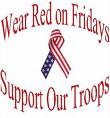
RED FRIDAYS —– You will begin seeing a great many people wearing Red every Friday.
The reason?
Americans who actively support our troops used to be called the ‘silent majority’. We are no longer silent, and are voicing our love for God, country and home in record breaking numbers.
We are not organized, boisterous or over-bearing. We get little media coverage on TV, to reflect our message or our opinions.
Many Americans, like you, me and our friends, simply want to recognize that the vast majority of Americans support our troops.
Our idea of showing solidarity and support for our troops with dignity and respect starts on Friday – and continues each and every Friday until the troops come home from war.
Every red-blooded American who supports our men and women afar should consider wearing something red.
A bunch of us are doing this.
Please join us.

Jul
1
Did You Know?
Filed Under Today's War | Comments Off on Did You Know?
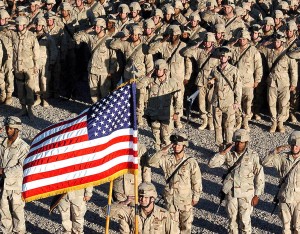
On our last blog we wrote about the reunion of Charlie Company, 3rd Battalion, 22nd Infantry. The banquet’s guest speaker was COL Rainey of Fort Carson. In his speech he mentioned how important it was that the American people know and realize the many accomplishments of the troops serving in Iraq and Afghanistan. Since the media often reports the “terrible” stuff, he shared some of the more positive accomplishments of the current 3rd Battalion, 4th Infantry at Fort Carson. The following list is pretty impressive. More importantly, it balances the picture of this current war – a balance that shows the good along with the bad and ugly. Are you aware of some of the accomplishments of our soldiers?
- Killed and captured over 3700 terrorists and criminals
- Recovered over 2700 enemy weapons caches
- Coached, taught, and mentored Iraqi security forces
- Increased the police forces by over 12,000 policemen
- Transitioned 50,000 Sons of Iraq to government control
- Executed 2680 projects, improving the lives of Iraqis… sewer, water, electricity, agriculture, trash…
- Issued $14 million in micro grants, creating 7,000 jobs
- Executed 168 micro-generation projects, providing reliable electricity to tens of thousands
- Opened 405 schools, 55 clinics/hospitals, 18 swimming pools, and 49 new parks
- Did this with less combat power – 44 to 21 Battalions and the size or our battle space doubled
Did you know that because of these beneficial works, our American troops are striving hard to win the minds and hearts of a foreign people in a foreign land? A short verse in the Bible states, “By their works you will know them”. Maybe, when we leave the battle ground of Iraq, we will leave a legacy of good deeds and a future of greater hope. Maybe, war is more than killing and pain. Maybe, it is also a bit about small kindnesses and humane acts of decency. At the very least, when we read about the conflicts in Iraq and Afghanistan, we will remember the other part of the story.


